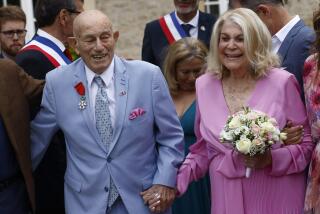Widows of WW I Vets Fading : Ever Fewer Answer Reveille as Time Takes Its Toll
- Share via
Some groups have a tough time recruiting. Take the Widows of World War I Veterans, for example.
Membership is open to any widow whose husband served in the Great War, but there are just fewer widows of World War I veterans around today. Some have died. Some are in retirement homes. Others are confined to their homes because of ill health.
“It’s a shame. We are a dying organization,” said Grace Busch of La Crescenta, an outspoken octogenarian and longtime member of the Crescenta-Canada Chapter of the Widows of World War I Veterans.
Organization’s Goals
The nonprofit, nationwide organization was founded in 1946 to obtain better pensions for war widows and to uphold the ideas of freedom, justice and democracy, according to its bylaws. It once claimed more than 10,000 members, old-timers say. Today, that figure has dwindled to 4,000.
The heyday of the Crescenta-Canada chapter came about 20 years ago, when about 60 women met once a month to reminisce about their husbands, write to legislators on behalf of veterans’ widows, play bingo and treat themselves to dinner, Busch said.
And each Veterans Day, the group would participate in memorial services, lay flowers on their husbands’ graves and deliver care packages to sick veterans in hospitals.
But not this year.
In April, with their ranks down to three dues-paying members, the Crescenta-Canada chapter voted to disband.
“We’d decorate the halls and set the tables, and nobody would show up,” recalled Glendale resident Doris R. Kepler, 85, who joined the chapter in 1971 when her husband died.
Busch, Kepler and 85-year-old Erma Westerholm, also of Glendale, say they now attend meetings at the Pasadena chapter.
But the Pasadena widows didn’t plan any Veterans Day ceremonies either this year, said the group’s president, Dorothy Klostlan. Their ranks are thinning, and the ladies are getting on in age.
It Gets More Difficult
Instead, Westerholm spent Veterans Day at the dentist, and Kepler, who is recovering from eye surgery, played bridge, as she does most Tuesdays. Busch, who suffers from rheumatism in the knees, said it is just too difficult for the three of them to go traipsing around to cemeteries and hospitals as they used to.
The triumvirate did gather briefly at Kepler’s house, however, to show a visitor memorabilia that included patriotic hats, and banners and pins emblazoned with the emblem “Widows of World War I Veterans.”
“We had such a wonderful group up there in the Foothills,” sighed Busch, who at 82 is the youngster of the bunch. She has been a member since 1959 and was national president in 1967 and 1973.
All three recalled that they became curious about the group after reading stories in the local newspapers. They eventually joined at the urging of friends.
“After my husband died, I began visiting the older ladies in the rest homes, and I would get so depressed. Then, my friend said, ‘Doris, what are you doing on Sunday, why don’t you come with me to a meeting?’ ” Kepler recalled.
She did so, and promptly joined.
Kepler’s husband, who grew up in Glendale, never actually fought in World War I. He enlisted in 1918, caught influenza shortly thereafter and spent the rest of the war in a Los Angeles hospital. He was probably lucky, Kepler acknowledges now. The “war to end all wars” killed 8 million, including 116,000 American soldiers.
Busch’s first husband was an Italian who fought in the allied army in Europe. Since the organization accepts women whose husbands fought for the United States or allied forces, Busch qualified for membership. Her second husband, who did not fight in World War I, has also died.
Westerholm’s husband served in France in 1917 and 1918 and took part in most of the major conflicts, including the bloody Battle of the Ardennes, his widow said.
Chose Not to Expand
Over the years, the Widows of World War I Veterans has had ample opportunity to expand its membership horizons. But it has opted not to, and thus its ranks have dwindled to the point where its demise is assured.
Some years ago, at a national convention, a number of women suggested that remarried widows with living husbands be allowed to join.
That idea was immediately turned down, Busch said.
Another year, a group of dissidents, including Busch, proposed that the group be expanded to include widows whose husbands served in World War II.
“You would have thought that we were stabbing them, they hollered so loud against that one,” Busch recalled.


